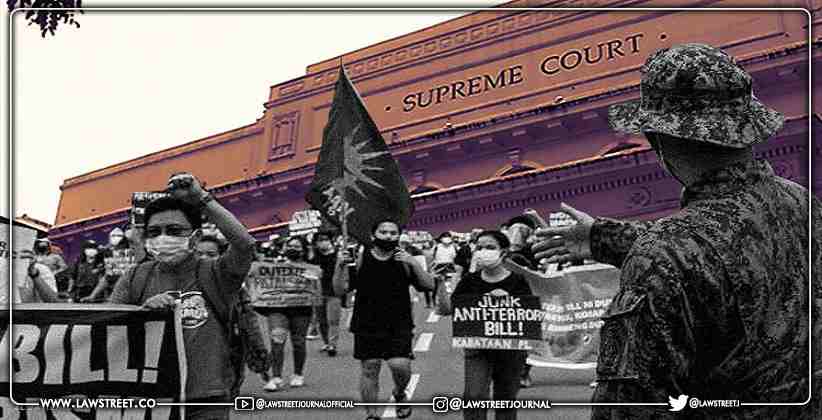The Philippines' Supreme Court largely upheld an anti-terrorism law this week that spawned rancorous challenges, in a ruling that could have far-reaching impacts in the Southeast Asian country. But the court struck down one measure, representing a partial win for petitioners who feared its sweeping definition of terrorism.
Philippine rights advocates, lawyers, journalists and clerics have been jailed, harassed and worse the past five and a half years under the leadership of President Rodrigo Duterte. Human rights activists fear the legislation could spell further suppression.
Among its provisions, the law punishes anyone officials deem to have incited terrorism through "speeches, proclamations, writings, emblems, banners and other representations."
The government maintained that it needs the anti-terrorism act to fight insurgencies.
But critics brought an unusually high number of legal challenges against the legislation, signed into law by Duterte last year. On Thursday (December 9, 2021) the Supreme Court previewed its verdict in a brief advisory that left petitioners stunned: In essence the court let the Anti-Terror Act of 2020 stand, declaring most of its provisions "not unconstitutional."
There was one notable exception. The court struck down a portion of a provision defining what constitutes terrorism, declaring it overly broad because it could have interpreted terrorism to include the exercise of civil rights like advocacy, protests and work stoppages.
Many Filipinos, whose mass demonstrations ousted a dictator three decades ago, are wary of any such encroachment on their rights. And the court in essence said activism is not terrorism.
However, opponents of the sweeping law said the provisions the court has validated would prolong the detention of suspects, violate the right of presumed innocence and encourage unreasonable searches and seizures. They insist the law remains draconian.
Activists are especially alarmed by the creation under the law of a presidentially appointed anti-terrorism council that's been conferred with vast powers.
"This includes the authority to examine bank accounts and freeze assets or organizations, to designate individuals and organizations as terrorists, apply for broad surveillance powers this is all without notice and judicial process," explained Rachel Chhoa-Howard, who researches the Philippines for Amnesty International.
The court declared a provision unconstitutional that allowed the anti-terrorism council to take requests from entities including international organizations to designate individuals or groups as terrorists. But the court upheld a clause that gives state security forces the power to arrest suspected terrorists and detain them for up to 24 days without charge.
Nine justices declared it was unconstitutional for the anti-terrorism council to be allowed to designate people and groups as terrorists based on the requests of other countries or international organizations, such as ASEAN or the EU. Petitioners called it a blatant violation of due process, because it deprived an accused the opportunity of any hearing in the Philippines before being designated a terrorist. It was the only other provision the court invalidated.
While some rights activists welcome what they call "a partial win," the ruling overall appears to be a significant victory for President Duterte. Several petitioners say they are planning to apply to the court for a reconsideration of the case.
The full text of the judgment is expected next week.






